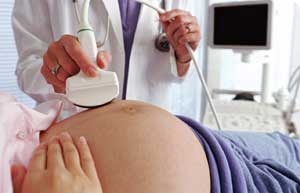Pregnant women with heart disease need to be given special attention, as many complications can arise that threaten the lives of both the mother and the fetus.
Heart Activity During Pregnancy
 |
(Image: BBC) |
During pregnancy, a woman’s heart rate gradually increases from the 10th week of gestation. By the end of pregnancy, the heart rate may increase by over 10 beats per minute compared to before, and the amount of blood the heart must pump to nourish both the mother and the fetus also increases.
From the 25th week of gestation onwards, the blood volume through the heart can increase by 30-50%. It is estimated that this “additional workload” of the heart amounts to between 2,160 to 3,600 liters per day, equivalent to approximately 2-4 tons.
The heart has to work harder because, during pregnancy, in addition to sustaining itself, the mother’s body must also supply oxygen and nutrients to the fetus.
For healthy women, pregnancy is a completely natural process, and the changes that occur are normal. However, for those with heart disease, these changes can become very dangerous.
Complications for Pregnant Women with Heart Disease
Complications can occur as early as the first weeks of pregnancy for those with severe heart disease. Generally, for pregnant women with heart disease, complications typically begin to appear from the third month of gestation onwards, as the mother’s circulatory system undergoes significant changes.
As the pregnancy progresses into the later stages, the risk of complications increases, especially during labor, delivery, the expulsion of the placenta, and in the early days postpartum.
Common complications include:
Acute Heart Failure: When heart function is weakened, along with the increased workload during pregnancy, especially during labor, the heart muscle may become exhausted and weakened. The heart rate may slow down and even stop completely, which is termed acute heart failure.
Acute Pulmonary Edema: Due to the heart’s reduced contractility, it fails to pump blood effectively, leading to blood congestion in the lungs. This results in fluid accumulation in the lungs, causing the patient to be unable to breathe, leading to oxygen deprivation and potentially death.
Arrhythmias: As the fetus develops, the enlarged uterus compresses the diaphragm and alters the heart’s axis from its normal position, effectively causing the heart to lie horizontally.
However, once the fetus is delivered, the uterus rapidly contracts back to its normal size, causing the heart to abruptly shift from a horizontal to its normal position, akin to a sudden drop. This abrupt change can lead to cardiac dysfunction, potentially resulting in a stroke or arrhythmia.
Infections: This complication often arises after childbirth, as bacteria can spread through the bloodstream, causing damage to the heart’s inner lining and leading to infections and inflammation known as endocarditis.
Many pregnant women with heart disease may maintain their health throughout pregnancy and childbirth, but they still face risks postpartum due to this infection.
Thromboembolic Events: The formation of blood clots during pregnancy, especially postpartum, can obstruct blood flow, with the most dangerous being pulmonary artery blockage.
Symptoms include shortness of breath, severe chest pain, cyanosis, and rapid death.
Considerations for Women with Heart Disease and Necessary Care During Pregnancy
When heart disease is present, the mother often suffers from a lack of oxygen and nutrients, which can hinder the development of the fetus in the womb. In the first trimester, this could lead to miscarriage or stillbirth.
Prolonged oxygen and nutrient deficiencies can result in fetal distress, leading to low birth weight (under 2,500g) or premature birth. These children are often weak and unable to adapt to the external environment, making them susceptible to infections.
If a child is born too prematurely, with underdeveloped lungs, they may suffer from respiratory distress syndrome (where the lung alveoli are covered by a translucent membrane), leading to inability to breathe and potential death.
Heart disease encompasses various types, with both severe and mild forms affecting the health of both the mother and the fetus, directly threatening lives, such as mitral valve stenosis, regurgitation, heart failure, etc.
Therefore, women with heart disease must make careful choices when deciding to become pregnant. If already pregnant, they should seek medical evaluation to determine if they can safely endure pregnancy and childbirth, which will help decide whether to continue or terminate the pregnancy.
During pregnancy, close monitoring of health is essential, along with a special diet, rest, and maintaining a positive mental state. If any unusual changes occur, immediate medical attention should be sought to prevent unfortunate complications from arising.
Dr. Nguyen Nam



















































